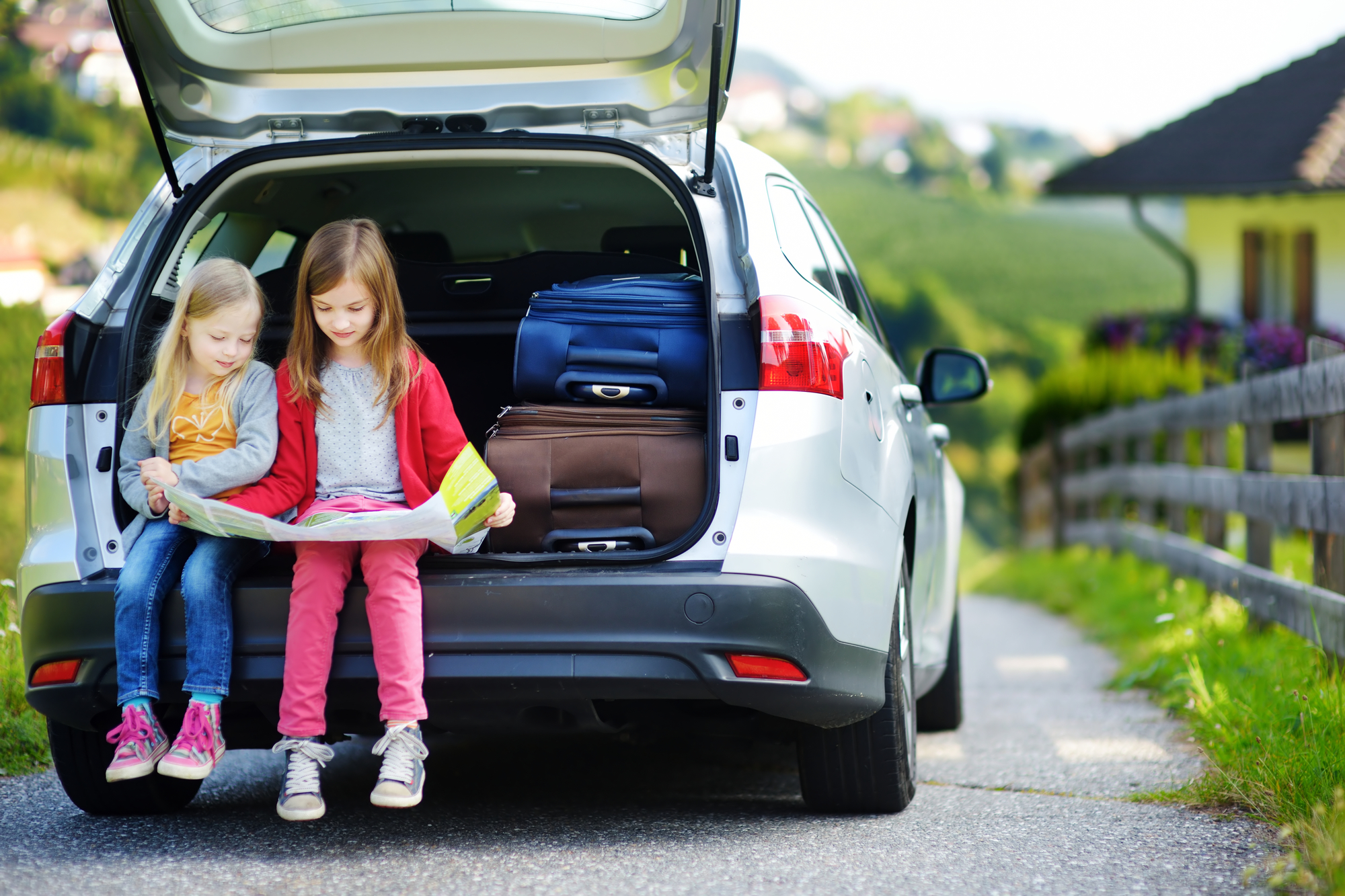Traveling with kids is a great way to experience new places, enjoy time together, and make memories for a lifetime. But … sometimes it can be challenging.
Traveling with kids can be filled with challenges, especially when traveling with children who are prone to anxiety or behavior problems. As a psychologist and mother of four kids, I’ve had lots of experience navigating these issues!
If you are planning to travel with your children …
Consider the helpful tips below and the whole experience will be easier for everyone. We’ll cover some top issues that come up on vacation like trouble with sleep, use of electronics, fear of flying, motion sickness, sibling fights, and more.
Why do some kids dislike traveling? Does technology play a role?
Children can dislike or avoid travel for a number of reasons. Some may feel anxious about leaving their familiar comfortable surroundings. Others, particularly teens, may prefer to stay near their friends and typical activities as opposed to spending time exclusively with family members. Those who are used to being connected to electronics constantly throughout the day may not want to “unplug” or risk being disconnected from their social media, video games, or other electronic stimulation. Children who are constantly allowed to engage in passive stimulation via electronics may also resist the idea of having to exert physical or mental effort to do activities on vacation; preferring instead to sit on the couch and watch television or play video games.
How does a fear of flying develop and what can parents do to ease anxiety about flying?
Many people have a fear of flying, and this can extend to children. Kids who tend to be anxious about life, in general, may be more prone to a fear of flying. Exposure strategies can be helpful to ease anxiety in preparation for air travel. Providing education at an age-appropriate level is very beneficial. Younger children can look at and read simple picture books showing the parts of a plane and walking through the process of taking a flight. Older children can read information online or via books about planes and plane travel. Taking a trip to the airport to watch planes take off and land, seeing the various things at the airport, and walking through the process of plane travel can also be helpful, as it provides exposure and reduces anticipatory anxiety.
Distractions for flying …
While on the flight it is helpful to have age-appropriate distractor activities such as books, coloring, small toys, familiar movies, etc. A bottle of water and familiar preferred snack options can also help. It is critical for parents to remain calm about the situation. When children see that parents are comfortable and relaxed it helps them feel more secure and reduces their anxiety.
Why you shouldn’t say “there’s nothing to worry about.”
A parent should avoid shaming children for their fears of flying, and should refrain from making statements like “there’s nothing to worry about.” It is more effective to use statements such as, “ I know you are really scared about being on the plane but I’ll be sitting right next to you and we will have our snack and look at your favorite books together.” Acknowledge how your child is feeling, let them know that you will be there to help them, and then highlight the strategies you will use together, to help them through it.
Electronics on vacation yay or nay?
These are questions I hear often – What can parents do when their children don’t want to be without their smartphone or other tech devices? Are there ways to use technology to enhance the travel experience?
There are studies showing that adults and children, particularly adolescents and young adults, experience stress when they do not have immediate access to their electronic devices (phones in particular). It is my professional opinion that parents should have clear boundaries around electronics use in order to help children develop healthy patterns of technology use and avoid addictive behavior. Vacations can provide an excellent time for implementing new rules and boundaries for electronics use if they have not been in place previously. One option is to have children leave their smartphones, handheld games, and other devices in the hotel room or car while out doing activities during the day. If they are not available there will not be arguments over them or the need for parents to monitor use.
If parents choose to allow their children to bring a device along with them on vacation outings, it is wise to keep it turned off and stored somewhere until specified times.
Make electronics part of the fun.
Parents who want to incorporate electronics into the trip in an engaging way can have their kids …
- Help take photos or write posts for a family blog
- Take photos for emails to friends/family
- Post to social media updating people on their adventures.
*One important thing to note here is that parents need to be prepared to put their devices down and fully engage in the vacation experiences as well! Adults need to model appropriate use of electronics for children.
Something I’ve observed …
Vacation is a good time to observe how easy or hard is it for your child to disconnect from their electronics. This can be a good indication of how device dependent they are in their daily life. It is easy to see if the use of their phones or video games has become problematic. A child who is resistive and struggles severely to reduce or remove electronics use when on vacation is a child whose use of electronics needs to be re-evaluated in general. Here’s some helpful info on how screentime effects mental and physical health.
How to help kids with motion sickness on cars, planes, or boats?
Motion sickness is a real issue for some children and can create challenges for travel. There are a variety of things that can cause motion sickness, but the overarching issue is a disconnect between what the ears experience, the movement of fluid in the inner canals, and what the eyes experience. The brain gets confused and disoriented, which creates a sensation of dizziness, nausea, etc. Children with sensory processing disorder may especially struggle with this. One simple solution for many young children is to ensure they are sitting in a car seat that allows them to see out the windows. When children cannot see their surroundings they are much more likely to have motion sickness. Some children will experience motion sickness if they have to ride facing backward, as there is a disconnect between their body’s perception of moving forward and their eyes seeing what is behind them. Make sure that children with motion sickness can sit in forward-facing seats on trains and boats. Simple solutions such as water, chewing gum, peppermint candy, and devices such as Sea Bands can also help.
How can parents help children who can’t sleep anywhere but their own beds?
Some children feel very anxious outside of their typical sleep surroundings. Bringing familiar sleeping items to new environments, such as a favorite blanket or stuffed animal, can be very helpful. If your child is used to sleeping with a night-light then bring it with you for added support. Practice camp-outs in sleeping bags or on air mattresses before leaving home, as this can be a fun way to help children acclimate to new sleep environments. When vacationing, try to maintain some of the typical bedtime routines in order to help your child stay calm and comfortable. For example, if you normally look at some books before bedtime then do that while on the trip. Another important tip is to make sure children are getting to bed at a decent time and are not overly exhausted. Keeping children up much later than they are used to on a regular basis will cause exhaustion and make sleep much more difficult!
Minimize sibling fights on planes or in the car while traveling
This is an age-old challenge for parents to manage when traveling with children! While it’s true that all siblings fight at times, there are ways to keep this to a minimum – and it doesn’t mean you need to resort to allowing all the kids to have their faces in an electronic device the entire time!
- Provide some games and activities to keep kids busy on long car or plane rides
- Classics include I-Spy, the alphabet game (find words on signs that start with each letter of the alphabet in order), and the license plate game (see how many states you can spot while on car trips)
- Listen to an audiobook or music together
- Color or draw
- Do crossword puzzles or other quiet activities
Parents may also need to set expectations at the start of the trip for behavior and what will happen if there are problems. Major issues may make it necessary for an adult to sit between children in the car or on the plane in order to help them manage themselves more appropriately.
I was recently asked by Conde Nast Traveler to share information and tips related to many common issues that arise when traveling with children.
Have you traveled with kids? What challenges have you had to navigate? I’d love to hear your travel-related tips, tricks, and stories in the comments below!
What You Should Do Next:
Sign up for my Better Behavior Naturally community newsletter
Sign up for my newsletter to get tips, resources, and supports to improve your child’s attention, anxiety, mood, and behavior…while making your job as a parent easier.
Enroll in one of my workshops
Check out one of my many workshops where you’ll join my exclusive community of parents in a one-of-a-kind virtual resource accessible 24/7. Whether you’ve got a child with a diagnosis like autism or ADHD, or are becoming more and more frustrated with a child who struggles to listen and cope, these workshops are designed to give you the information, tools, and support you need…whenever you need it.








